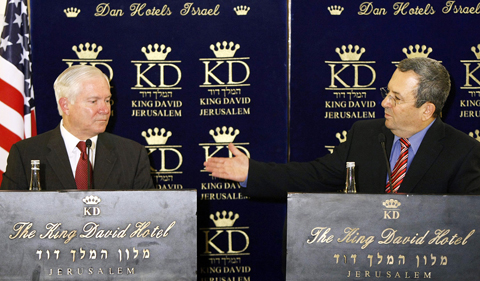Israel’s defense minister told visiting US Secretary of Defense Robert Gates yesterday that his country is taking “no option” off the table on Iran’s nuclear program, indicating that a military strike is still a possibility even as Washington tries to persuade Israel to give diplomacy more time.
“This is our position. We mean it,” Defense Minister Ehud Barak said, standing alongside Gates.
But Barak also said diplomacy should be the current priority.

PHOTO: REUTERS
Gates’s visit to Israel was partially aimed at dissuading Israel from taking any military action and buying time for US diplomacy to bear fruit.
However, Barak’s no-options-off comment — repeated three times — seemed to indicate Gates made no visible headway in getting Israel to soften its line.
Still, the comments did not signal a major rift with the US, which has also said there is a time limit for its diplomatic outreach. Israel has shown little enthusiasm for a global diplomatic effort that so far has failed to persuade Tehran to curb its nuclear program.
The US and Israel believe Iran is attempting to develop atomic weapons. Israel sees a nuclear-armed Iran as an existential threat, particularly in light of bellicose comments from Iranian President Mahmoud Ahmadinejad and Tehran’s support for violent anti-Israel militant groups.
Iran says its nuclear program is exclusively aimed at producing electricity.
Acknowledging Israel’s concerns, Gates said the US administration’s attempt to engage Iran was “not an open-ended offer” and that the US was aware Iran might try to “run out the clock.”
“We will deal with the situation at the appropriate time,” Gates said, saying he hoped Iran would respond by the UN General Assembly this fall.
He said sanctions were a possibility if diplomacy fails, while also mentioning plans for a loosely defined “defense umbrella” meant to protect US allies in the region.
“We will continue to ensure that Israel has the most advanced weapons for its national defense,” he said.
Israeli leaders have repeatedly expressed skepticism that diplomacy could work with what they see as a hostile, anti-Western theocracy in Iran.
Barak said he hoped diplomacy would succeed, but urged the US to set a short deadline and prepare hard-biting financial sanctions against Iran.
“Israel remains in its basic position that no options should be removed from the table, even though priority at this stage should be given to diplomacy,” he said.
Israeli officials have said little about what military action they might have in mind. But the country has conducted a number of military exercises widely seen as possible preparations, including long-range air force maneuvers and recent movement of Israeli warships and submarines through the Suez Canal, the quickest route to the Persian Gulf from Israel.
Last week, US and Israel conducted a joint missile-defense test off the coast of California designed to protect against a possible Iranian strike on Israel. The test failed, though Israeli officials characterized it as a minor setback.

Kehinde Sanni spends his days smoothing out dents and repainting scratched bumpers in a modest autobody shop in Lagos. He has never left Nigeria, yet he speaks glowingly of Burkina Faso military leader Ibrahim Traore. “Nigeria needs someone like Ibrahim Traore of Burkina Faso. He is doing well for his country,” Sanni said. His admiration is shaped by a steady stream of viral videos, memes and social media posts — many misleading or outright false — portraying Traore as a fearless reformer who defied Western powers and reclaimed his country’s dignity. The Burkinabe strongman swept into power following a coup in September 2022

‘FRAGMENTING’: British politics have for a long time been dominated by the Labor Party and the Tories, but polls suggest that Reform now poses a significant challenge Hard-right upstarts Reform UK snatched a parliamentary seat from British Prime Minister Keir Starmer’s Labor Party yesterday in local elections that dealt a blow to the UK’s two establishment parties. Reform, led by anti-immigrant firebrand Nigel Farage, won the by-election in Runcorn and Helsby in northwest England by just six votes, as it picked up gains in other localities, including one mayoralty. The group’s strong showing continues momentum it built up at last year’s general election and appears to confirm a trend that the UK is entering an era of multi-party politics. “For the movement, for the party it’s a very, very big

ENTERTAINMENT: Rio officials have a history of organizing massive concerts on Copacabana Beach, with Madonna’s show drawing about 1.6 million fans last year Lady Gaga on Saturday night gave a free concert in front of 2 million fans who poured onto Copacabana Beach in Rio de Janeiro for the biggest show of her career. “Tonight, we’re making history... Thank you for making history with me,” Lady Gaga told a screaming crowd. The Mother Monster, as she is known, started the show at about 10:10pm local time with her 2011 song Bloody Mary. Cries of joy rose from the tightly packed fans who sang and danced shoulder-to-shoulder on the vast stretch of sand. Concert organizers said 2.1 million people attended the show. Lady Gaga

SUPPORT: The Australian prime minister promised to back Kyiv against Russia’s invasion, saying: ‘That’s my government’s position. It was yesterday. It still is’ Left-leaning Australian Prime Minister Anthony Albanese yesterday basked in his landslide election win, promising a “disciplined, orderly” government to confront cost-of-living pain and tariff turmoil. People clapped as the 62-year-old and his fiancee, Jodie Haydon, who visited his old inner Sydney haunt, Cafe Italia, surrounded by a crowd of jostling photographers and journalists. Albanese’s Labor Party is on course to win at least 83 seats in the 150-member parliament, partial results showed. Opposition leader Peter Dutton’s conservative Liberal-National coalition had just 38 seats, and other parties 12. Another 17 seats were still in doubt. “We will be a disciplined, orderly